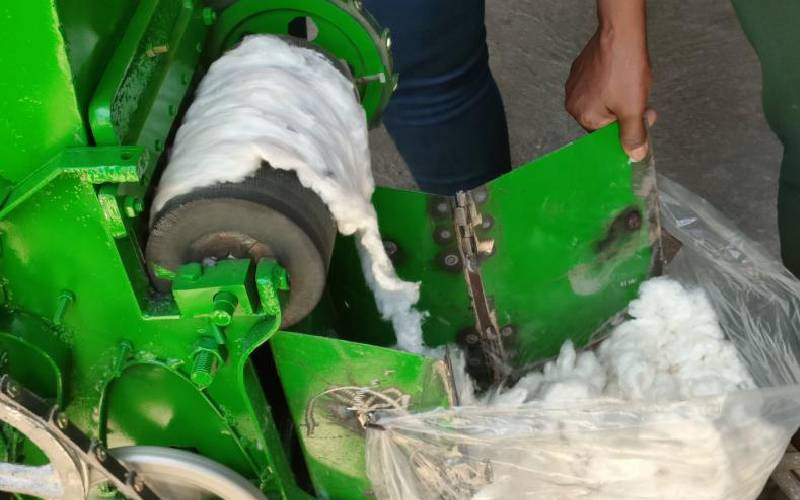By Kenneth Kwama
The protracted battle over installation of electronic cargo tracking systems (ECTS) between the Kenya Revenue Authority (KRA) and truckers could derail implementation of the new system designed to ensure maximum collection of revenue on transit goods and set back efforts by the taxman to curb theft of cargo.
Despite fervent appeals by the revenue collector, 92 per cent of transporters are yet to install the gadget that the taxman touts as the ultimate answer to tax evasion, loss of cargo and cheating that has dogged tax collection on goods being transported over long distances. According to a source privy to the deliberations between KRA and the Kenya
Transporters Association (KTA), both parties have hardened their positions over the devices even as it emerged there could be a split at the KTA because some of its members have gone ahead to install the new gadget despite its objections.
"Those opposed to the ECTS could be making noise over a system whose benefits they don’t understand. We installed it and it is working well for us because we can track our trucks and know where the cargo is. We can also tell whether our consignment has been tampered with or not," says Eric Waithaka, general manager at Compact Freight Systems.
The company does a lot of transfer of shipments from Mombasa and transports huge volumes to local destinations. This week, it will transfer at least 200 containers from the port and has a vessel with close to another 180 containers to handle.
Domestic and transit cargo transporters were directed to install the ECTS on their trucks by June 30, last year.
GPRS technology
But the transporters’ umbrella raised contentious issues regarding the pricing and the manner in which KRA procured a supplier for the gadgets. The transporters also took issue with the manner in which Nairobi-based firm-Navisat Telematic- was picked to oversee the process.
KRA had initially appointed Navisat as the sole provider, but later backed down and allowed two more players, SGS and Cotecna to also supply the gadgets.
"Currently, the cost of fitting the gadget, which uses GPRS technology to track the movement of goods, is Sh42,000 plus a communication fee of Sh2,500 per month," said our source.
Unofficial statistics from the tax collector shows that only 1,500 trucks out of the 20,000 delivering cargo from the port have so far been fitted with the gadget.
The system, which monitors goods on transit between Mombasa and the country’s border points, is part of the taxman’s reform process that is aimed at improving efficiency and security of goods in transit.
Vehicles carrying cargo for export must be licensed and have the tracking mechanism installed by the transporters.
The cargo is loaded onto the truck under supervision of KRA officers who seal the container using an electronic seal. Movement of the truck and the status of the seal are monitored and provide information on the location of the vehicle and the status of the seals.
Any deviation from the designated export or transit route or any attempts to tamper with the seal sends an alert, which is transmitted to rapid response units stationed along the designated routes.
Tax registers
The rapid response units then arrest the offending vehicle. On reaching the port of exit from Kenya, or upon receipt by tax authorities in the destination country, the electronic seal is disarmed by Kenyan tax authorities.
Efforts to get the KRA commissioner of domestic taxes in charge of the large taxpayers, Mr John Njiraini, to comment were fruitless. Navisat Managing Director Walter Kiilu declined to talk.
With the KRA adamant that all transporters ferrying cargo from Mombasa have to comply with the directive to install the ECTS on their trucks, the battle is set to follow a similar script that played out when traders refused to comply with the authority’s directive to install electronic tax registers (ETRs) a few years ago.
Just like it happened in the ETR saga, last year the High Court temporarily halted implementation of the new ECTS after the transporters’ umbrella body KTA went to court challenging its introduction.
In the months leading to the introduction of the ETR, traders put up a spirited fight against KRA implementing the registers directive, which was included in the 2004 Budget speech. Traders, under the umbrella United Business Association (UBA), filed several cases in court to oppose the directive.
At some point, the resistance spilled onto the streets of major towns across the country as thousands of traders closed shops and held demonstrations in protest.
In Nairobi, they marched to KRA’s headquarters and presented a memorandum.
The traders eventually ceded ground and the KRA had its way. Today, ETR machines are part of business in the country.
KRA is said to be keen on having the system fully implemented because it will allow for advanced processing of information by border agencies and help defeat the vulnerabilities associated with inland transport such as colossal revenue losses resulting from diversion of transit goods. It will also help reduce the amount of time taken to transport goods from the Mombasa port to neighbouring countries like Uganda, reduce insurance premiums and reduce the time required before cancellation of security bonds transporters are required to obtain for transit goods.
Trade facilitation
Uganda’s President Yoweri Museveni is on record complaining that it takes cargo shorter time to transport from Europe than from Kenya to Uganda. The ECTS is also expected to eliminate the need for physical escorts for transit goods, thus shorten transportation span because trucks will no longer be required to line up while waiting for police escorts from the KRA.
Insiders say the system could catapult the KRA to position eight up from the current position 112 it occupies in the pecking order of world customs’ authorities in terms of trade facilitation.
KRA and many other customs agencies world over are losing millions of dollars through cargo diversion and dumping.
Although the volume of transit cargo that is lost in the country due to theft has not been documented, it is estimated that about $40 billion worth of global trade cargo is lost each year through theft.
While cargo owners are happy with the new regulations, which they say will improve the safety of their cargo, transporters have objected citing costs associated with implementation.
The ECTS is one of the most advanced systems in the world. According to industry sources, the cargo tracking system in use was designed following interviews with customs officials, port operators, customs brokers and transporters.
The interviews identified the methods used to divert transit goods, the level of risk of diversion, the weakness exploited and the impact of violations. The major problem identified was a weak security feature.
 The Standard Group Plc is a multi-media organization with investments in media
platforms spanning newspaper print operations, television, radio broadcasting,
digital and online services. The Standard Group is recognized as a leading
multi-media house in Kenya with a key influence in matters of national and
international interest.
The Standard Group Plc is a multi-media organization with investments in media
platforms spanning newspaper print operations, television, radio broadcasting,
digital and online services. The Standard Group is recognized as a leading
multi-media house in Kenya with a key influence in matters of national and
international interest.
 The Standard Group Plc is a multi-media organization with investments in media
platforms spanning newspaper print operations, television, radio broadcasting,
digital and online services. The Standard Group is recognized as a leading
multi-media house in Kenya with a key influence in matters of national and
international interest.
The Standard Group Plc is a multi-media organization with investments in media
platforms spanning newspaper print operations, television, radio broadcasting,
digital and online services. The Standard Group is recognized as a leading
multi-media house in Kenya with a key influence in matters of national and
international interest.










